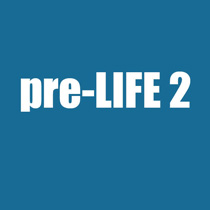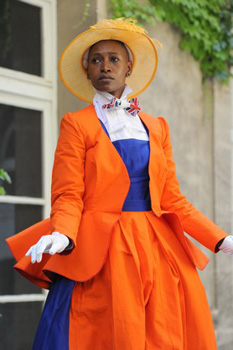
Pre-Life 2 will focus on the themes Republic and Femininities. The evening will comprise the screening of a film, visual presentations and panel discussions. In the panel on Republic, chaired by writer Mike van Graan, artists engage with notions of the formation and dissolution of nation, state, nationalisms, the republic, authority and the individual. Performance artist Julia Raynham and photographer Noncedo Gxekwa discuss the creation of their fresh new work, Monsoon, which premieres at the Live Art Festival. The work explores trade mobility in Southern East Africa and the transformation of nations from indigenous state culture, to colonial culture, to nationalist culture. Raynham examines the large-scale topography of nationhood through historical transformation. Award-winning choreographer Mamela Nyamza reflects on how her work has been a regular conversation with history, past and present. She will also analyse the historical importance of 1976, its remnants in relation to nation building, and its fractured and compelling representation in the work 19Born76Rebels, which will also be presented for the Live Art Festival.

In the panel on Femininities, UK-based performance artist Rosa Postlethwaite and writer Palesa Motsumi will engage with the plural version of femininity, which signals a wide, discursive scope of approaches. This panel will begin with the screening of Indian performance artist Maya Rao’s performance WALK – a response to the brutal attack of Jyothi Singh Pandey that took place in a moving bus on the streets of New Delhi in India. Rao’s performance contributed to the galvanising of a nationwide response in India that was unprecedented. Postlethwaite discusses the film and the production Walk: South Africa, which was inspired by Rao’s work and will be presented at the Live Art Festival. In atmospheres of suspended definitions and reclamations of sexuality and identities, writer Palesa Motsumi explores how writers in the African literary canon deal with femininity in their process of storytelling.
Pre-LIFE 2 will take place on Thursday 21 August at 17:30 at Hiddingh Hall, University of Cape Town (UCT) Hiddingh Campus, Orange Street, Cape Town; and is free. Refreshments will be served from 17:00; no booking is necessary. For more information, contact the GIPCA office on 021 480 7156 or fin-gipca@uct.ac.za, or visit www.gipca.uct.ac.za.
About the panellists:
Julia Raynham works in between socially engaged performance, pedagogy, music, film, design, conceptual and visual art. Her performance art work explores transience, transformation and the possibilities of transcendence in contemporary society. She is particularly interested in rhythms of production and cooperative practices that present a step forward in the democratization of knowledge of contemporary art and the aesthetic experience. She is the executive director of Resonance Bazar, and the Director of Joule City Incubator & Research Hub.
Noncedo Gxekwa is a photographer and fashion stylist. Her creative practice engages collaborative forms of photography, and the immediacy of avant garde fashion. She has exhibited in many group exhibitions, including the Lovell Gallery Competition, Bonani group exhibition, and choreographing the demonstration Performing being Black” with the work Intsimbi Ayigobi. Gxekwa is a member of Subtle Agency – an artist collective investigating the dynamic cultural landscapes and curative practices of healers; and the Intermission Collective – which explores the hybrid body through mysticism, memory and alternative realities.
Award-wining choreographer and performer, Mamela Nyamza, is a Standard Bank Young Artist Award Winner for Dance (2011), and Donald Gordon Creative Arts Fellow (2012).The provocative choreographer’s work considers the engendered body, and the contemporary meaning of dance through her experimentation around themes of men and (mostly) women’s roles and issues. She asks how a body can use its instrument outside of conventional expectations, using dance to gain access to the deepest parts of the body, emotions, lightness and fears, and to elicit higher demands of ourselves. Practically, her interest lies in deep exploration of experimental forms of natural movement; and the simplicity of choreographing without using dance steps that are typical, often through the juxtaposition of movement of untrained and trained dancers.
Mike van Graan is the Executive Director of the African Arts Institute (AFAI), a South African NGO based in Cape Town whose two-fold mission is to help develop leadership for the African creative sector and to build regional markets for African artists and their creative works. Until recently, he also served as the Secretary General of Arterial Network, a Pan African network of artists, cultural activists, creative enterprises and others engaged in the African creative sector and its contribution to human rights, democracy and development on the African continent. He was appointed as Artscape’s Associate Playwright and is considered as one of South Africa’s leading contemporary playwrights, having garnered numerous nominations and awards for his plays that interrogate the post-apartheid South African condition. Van Graan received the Standard Bank Standing Ovation award at the 2012 National Arts Festival for his sustained contribution to the Festival as a writer and activist.
Born in the UK and based in Cape Town, Rosa Rogers Postlethwaite is a performance maker with an interest in autobiographical acts and the places they construct. She holds a degree in Drama from Queen Mary University of London and is currently studying towards a Masters in Theatre and Performance at the University of Cape Town. In 2011 she co- founded, devised theatre company, Dark Hills with which she has performed in venues across London and showcased work at the Edinburgh Fringe Festival (2011, 2012). Most recently she collaborated with the Scalabrini Drama Group to present Centre at the Infecting the City Festival and the AVA Gallery. Walk: South Africa was co-created and performed by Sara Matchett. Genna Gardini, Koleka Putuma, Nina Callaghan and Siphumeze Kundayi.
Sematsatsa Library was first formulated to be a lifestyle brand, engineered to inspire and feed off the culture and pulse of African women. With this in mind, founder and Creative Director Palesa Motsumi approached several peers about their definition of the word “Sematsatsa”. Linguistically, the word is used, specifically in Sesotho, Sepedi and Setswana to describe a certain essence of a woman. During this year’s Youth month, Motsumi, through Sematsatsa Library initiated Journey Into African Literature as a conceptual pop-up library where books and literary works could be discussed and shared. This August, Journey into African Literature will explore some of the creative literary experiences of female writers, poets and thinkers who are re-imagining the continent.
Pre-Life 2 panel discussion audio recording available for download.
Start: 21 Aug ’14 5:30 pm
End: 21 Aug ’14 6:30 pm
Cost: Free
Category: Discussion, Film, Live Art
Organizer: GIPCA
Email: fin-gipca@uct.ac.za
Venue: Hiddingh Hall
Phone: +27 21 480 7156
Address: Google Map UCT Hiddingh Campus, 31 Orange Street, Cape Town, Western Cape, 8001, South Africa
